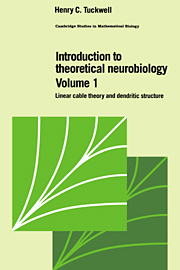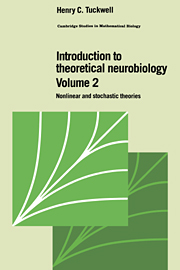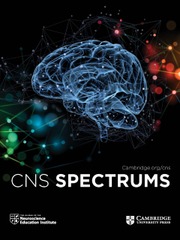Introduction to Theoretical Neurobiology
Volume 1. Linear Cable Theory and Dendritic Structure
Part of Cambridge Studies in Mathematical Biology
- Author: Henry C. Tuckwell, University of California, Irvine
- Date Published: March 2011
- availability: This ISBN is for an eBook version which is distributed on our behalf by a third party.
- format: Adobe eBook Reader
- isbn: 9780511828751
Find out more about Cambridge eBooks
Adobe eBook Reader
Other available formats:
Paperback, Hardback
Looking for an examination copy?
This title is not currently available for examination. However, if you are interested in the title for your course we can consider offering an examination copy. To register your interest please contact [email protected] providing details of the course you are teaching.
-
The human brain contains billions of nerve cells whose activity plays a critical role in the way we behave, feel, perceive, and think. This two-volume set explains the basic properties of a neuron--an electrically active nerve cell--and develops mathematical theories for the way neurons respond to the various stimuli they receive. Volume 1 contains descriptions and analyses of the principle mathematical models that have been developed for neurons in the past thirty years. It provides a brief review of the basic neuroanatomical and neurophysiological facts that will form the focus of the mathematical treatment. Tuckwell discusses the mathematical theories, beginning with the theory of membrane potentials. He then goes on to treat the Lapicque model, linear cable theory, and time-dependent solutions of the cable equations. He concludes with a description of Rall's model nerve cell. Because the level of mathematics increases steadily upward from Chapter Two some familiarity with differential equations and linear algebra is desirable.
Reviews & endorsements
"It will undoubtably prove to be very useful for experimentalists...Its application will clearly help experimentalists and modelers to better understand thte behavior of their research system...an up-to-date comprehensive effort that encompasses the major analytical approaches to neuronal modeling at the cellular level." --Physics Today
Customer reviews
Not yet reviewed
Be the first to review
Review was not posted due to profanity
×Product details
- Date Published: March 2011
- format: Adobe eBook Reader
- isbn: 9780511828751
- availability: This ISBN is for an eBook version which is distributed on our behalf by a third party.
Table of Contents
Preface
1. Introductory neuroanatomy and neurophysiology: the properties of motoneurons
2. The classical theory of membrane potentials
3. The Lapicque model of the nerve cell
4. Linear cable theory for nerve cylinders and dendritic trees: steady-state solutions
5. Time-dependent cable theory for nerve cylinders and dendritic trees
6. Rall's model neuron
References.
Sorry, this resource is locked
Please register or sign in to request access. If you are having problems accessing these resources please email [email protected]
Register Sign in» Proceed
You are now leaving the Cambridge University Press website. Your eBook purchase and download will be completed by our partner www.ebooks.com. Please see the permission section of the www.ebooks.com catalogue page for details of the print & copy limits on our eBooks.
Continue ×Are you sure you want to delete your account?
This cannot be undone.
Thank you for your feedback which will help us improve our service.
If you requested a response, we will make sure to get back to you shortly.
×







